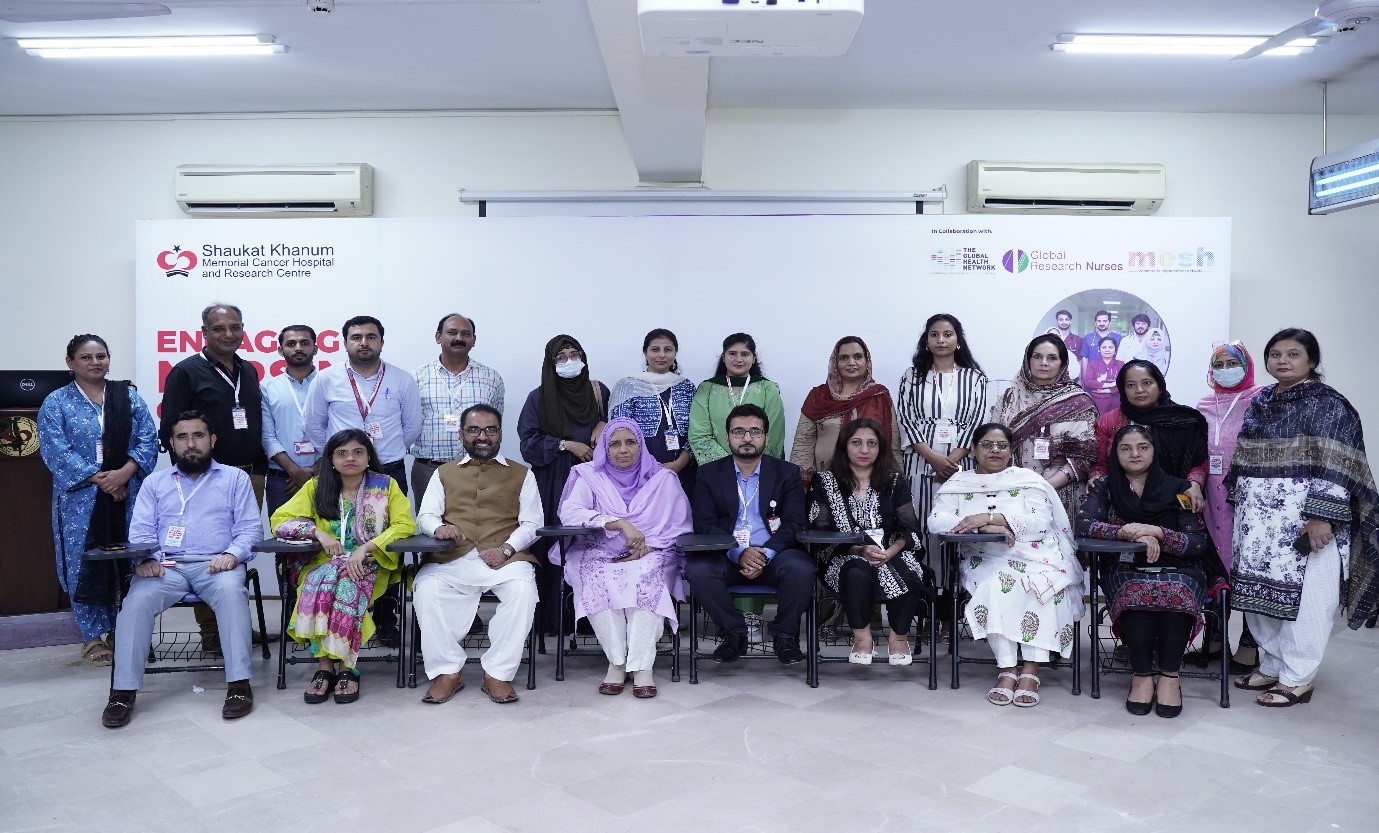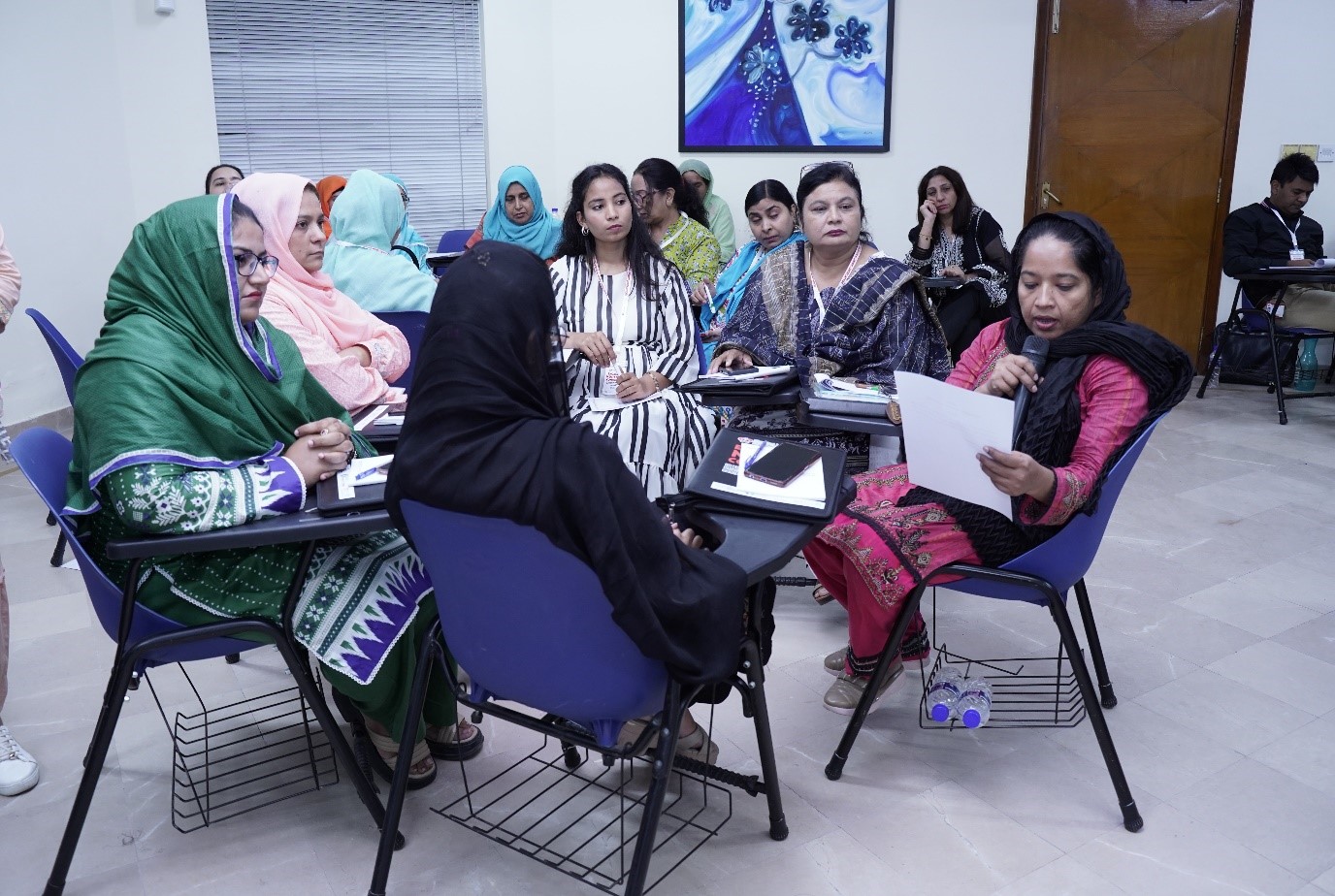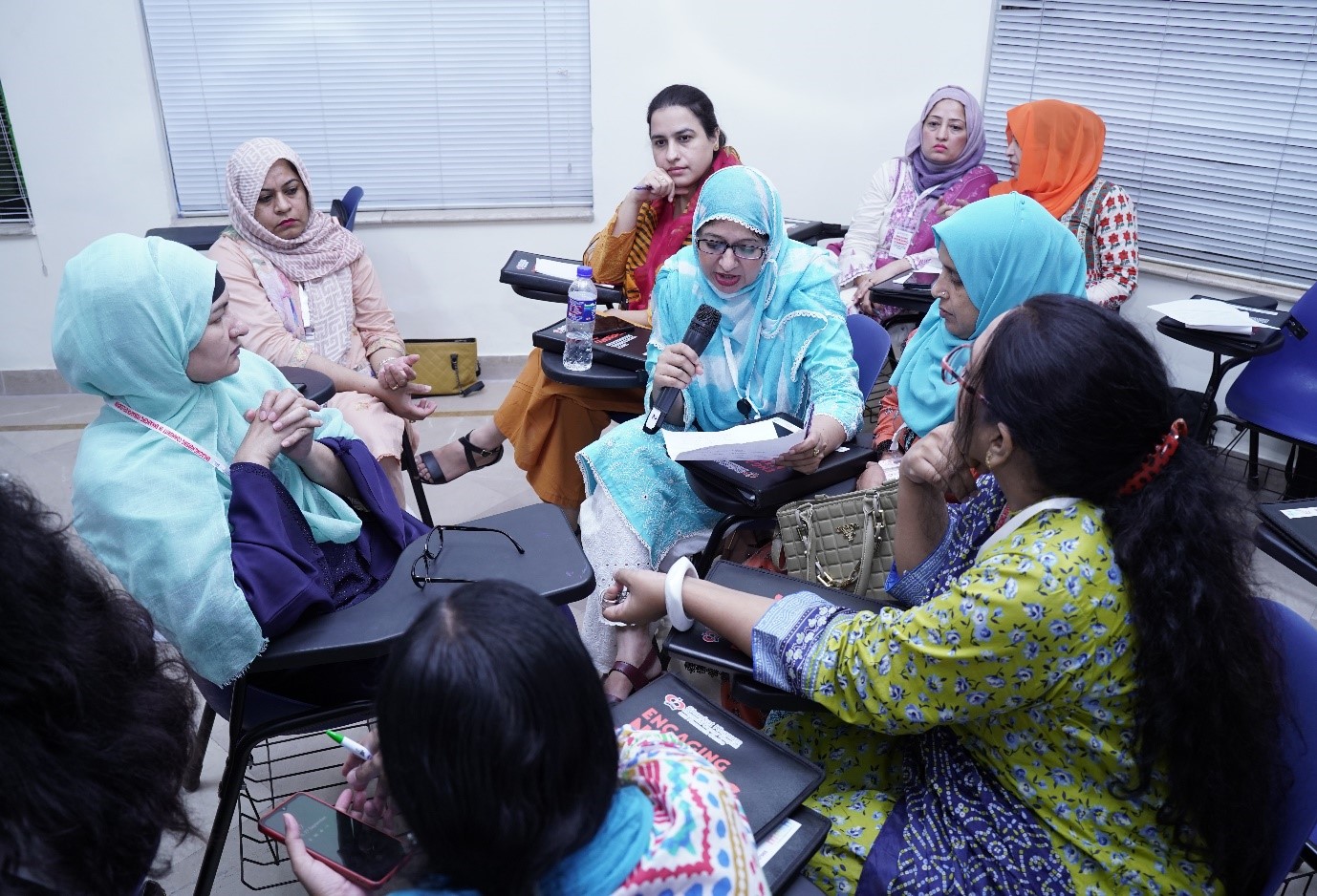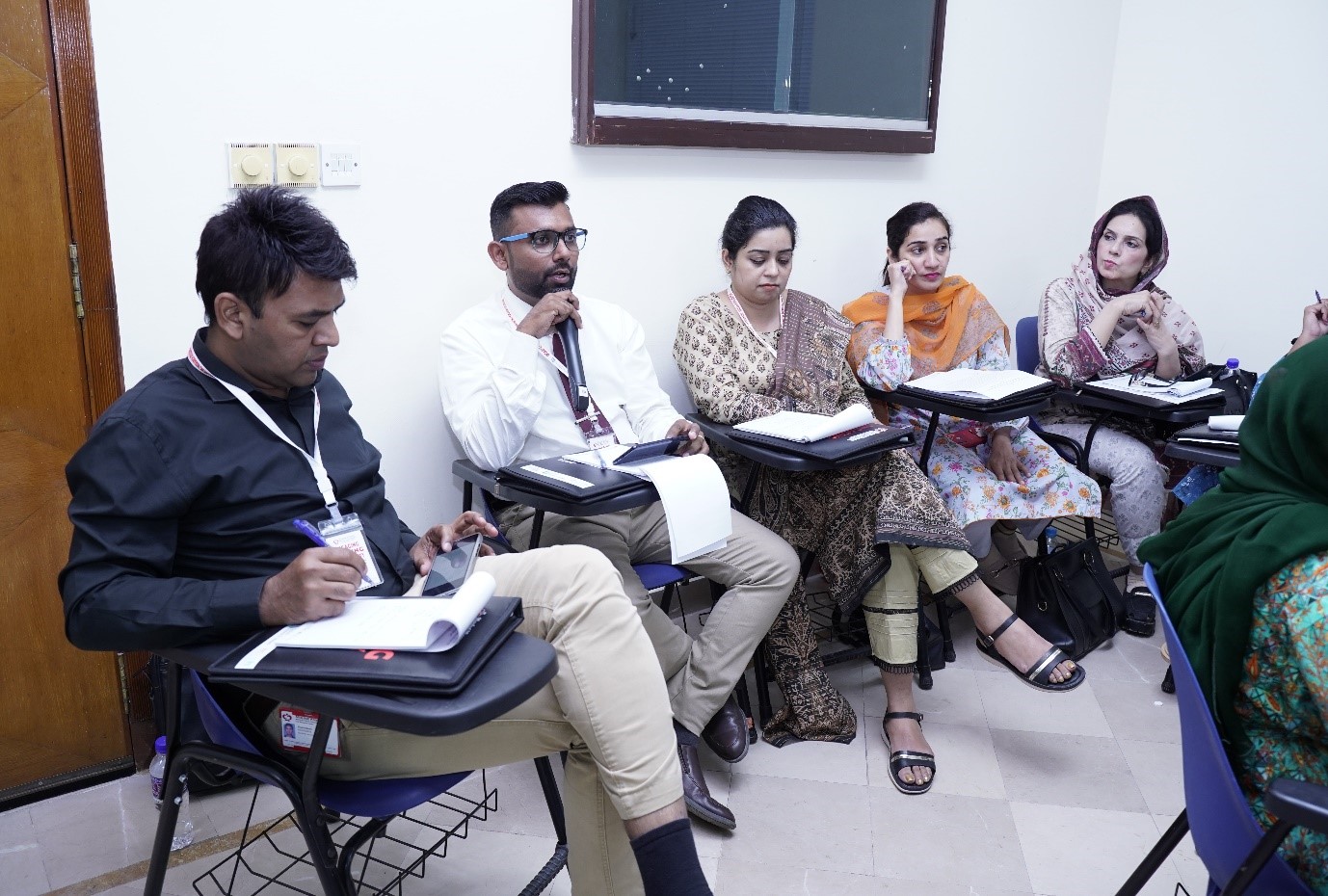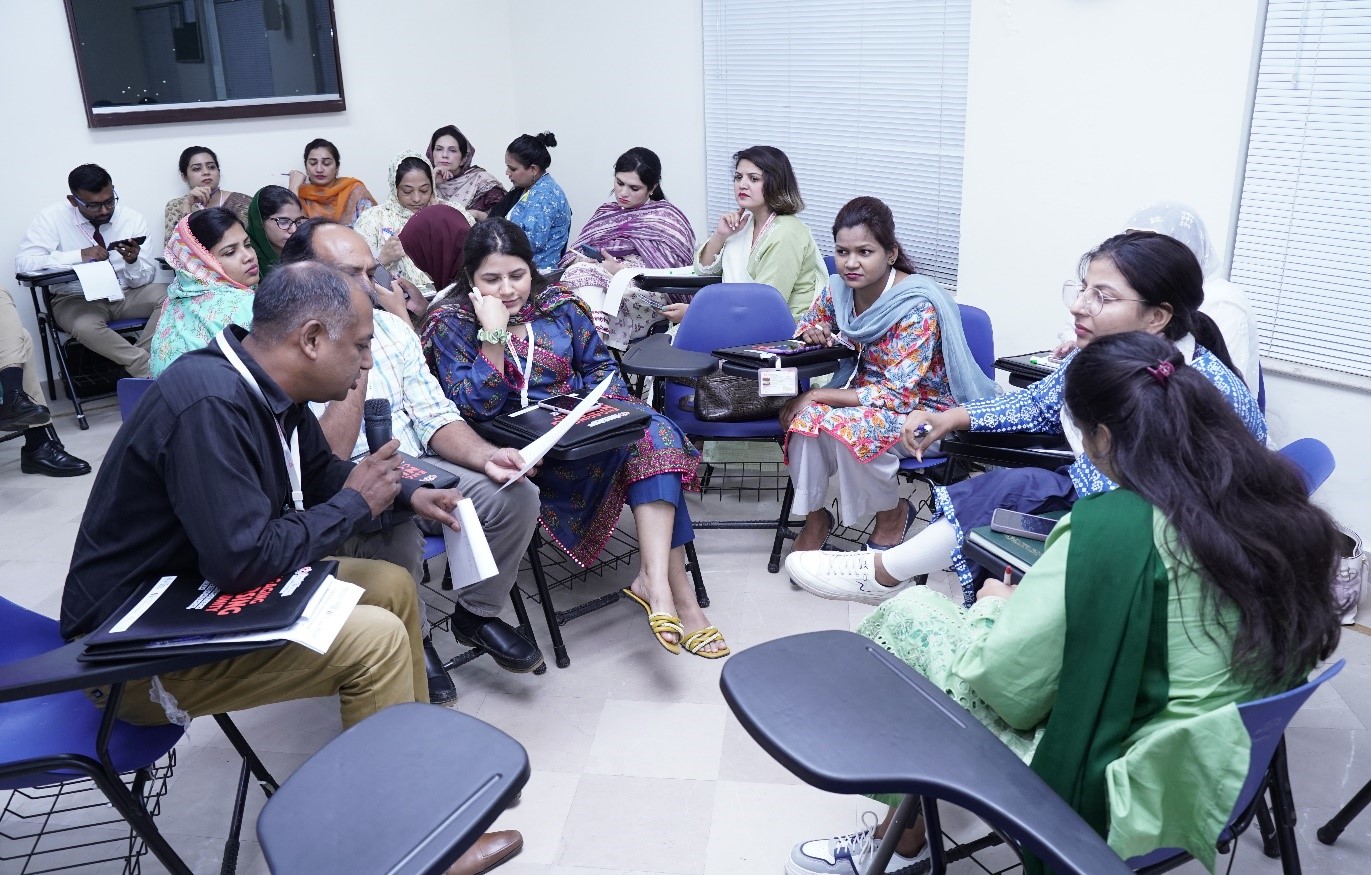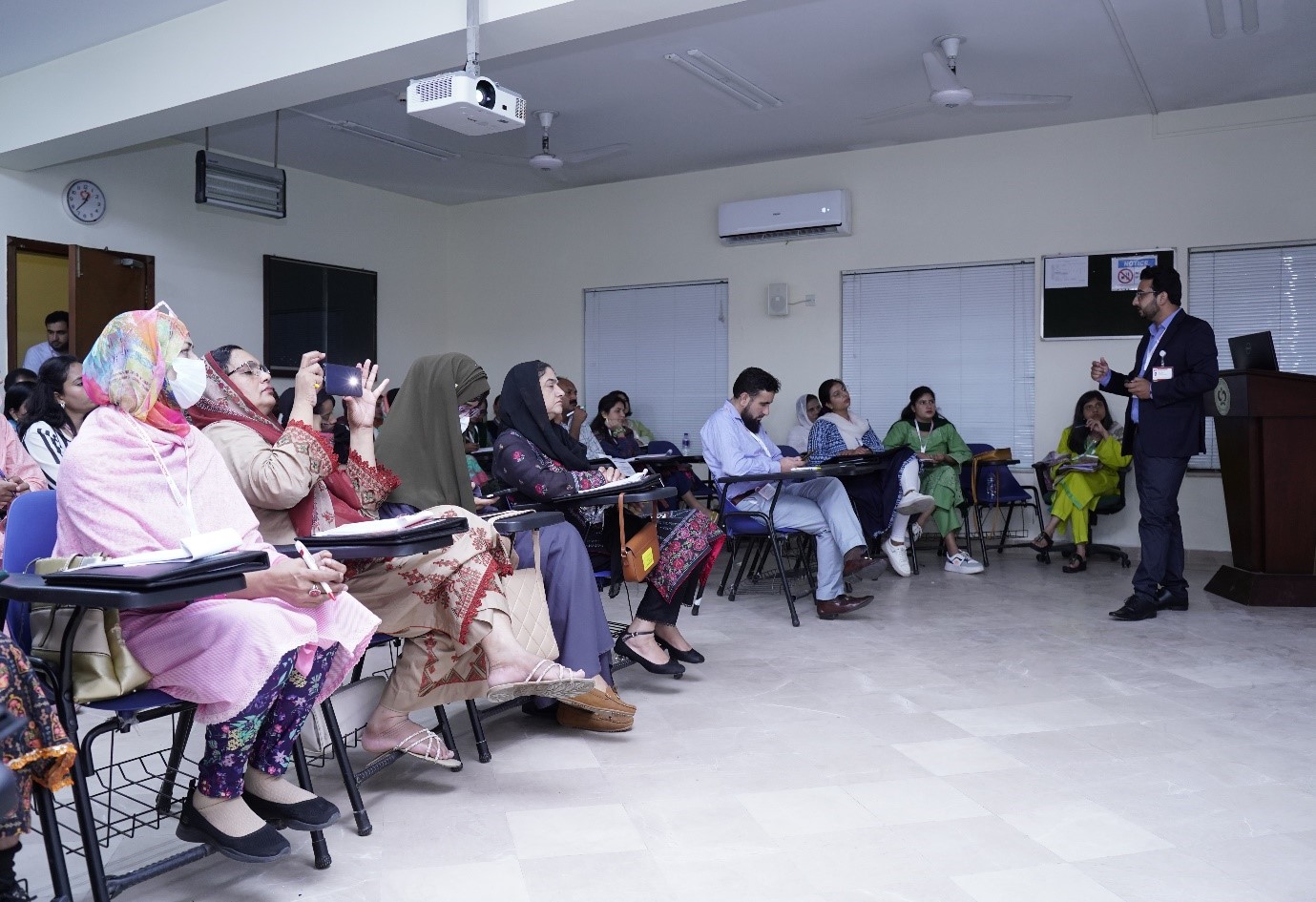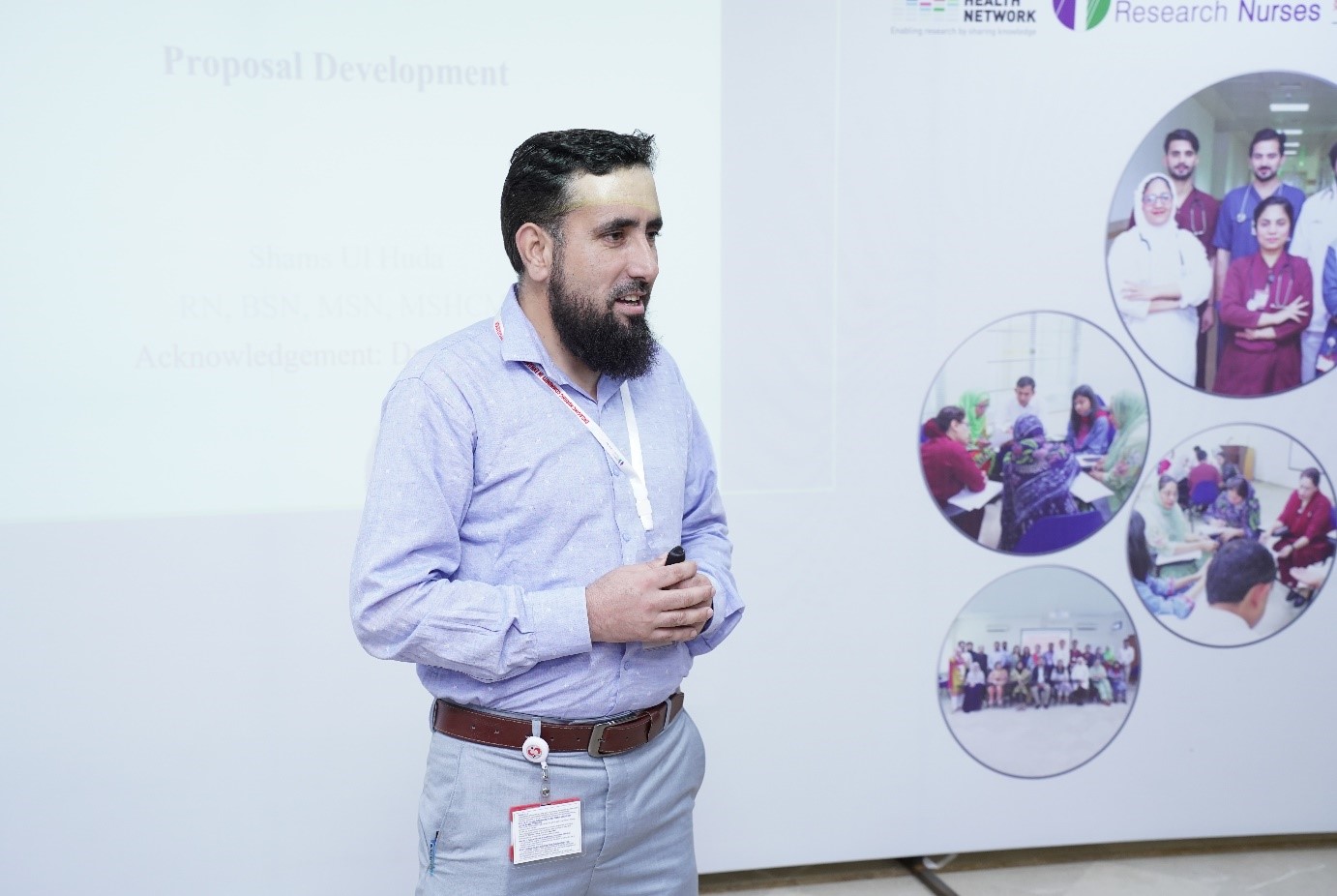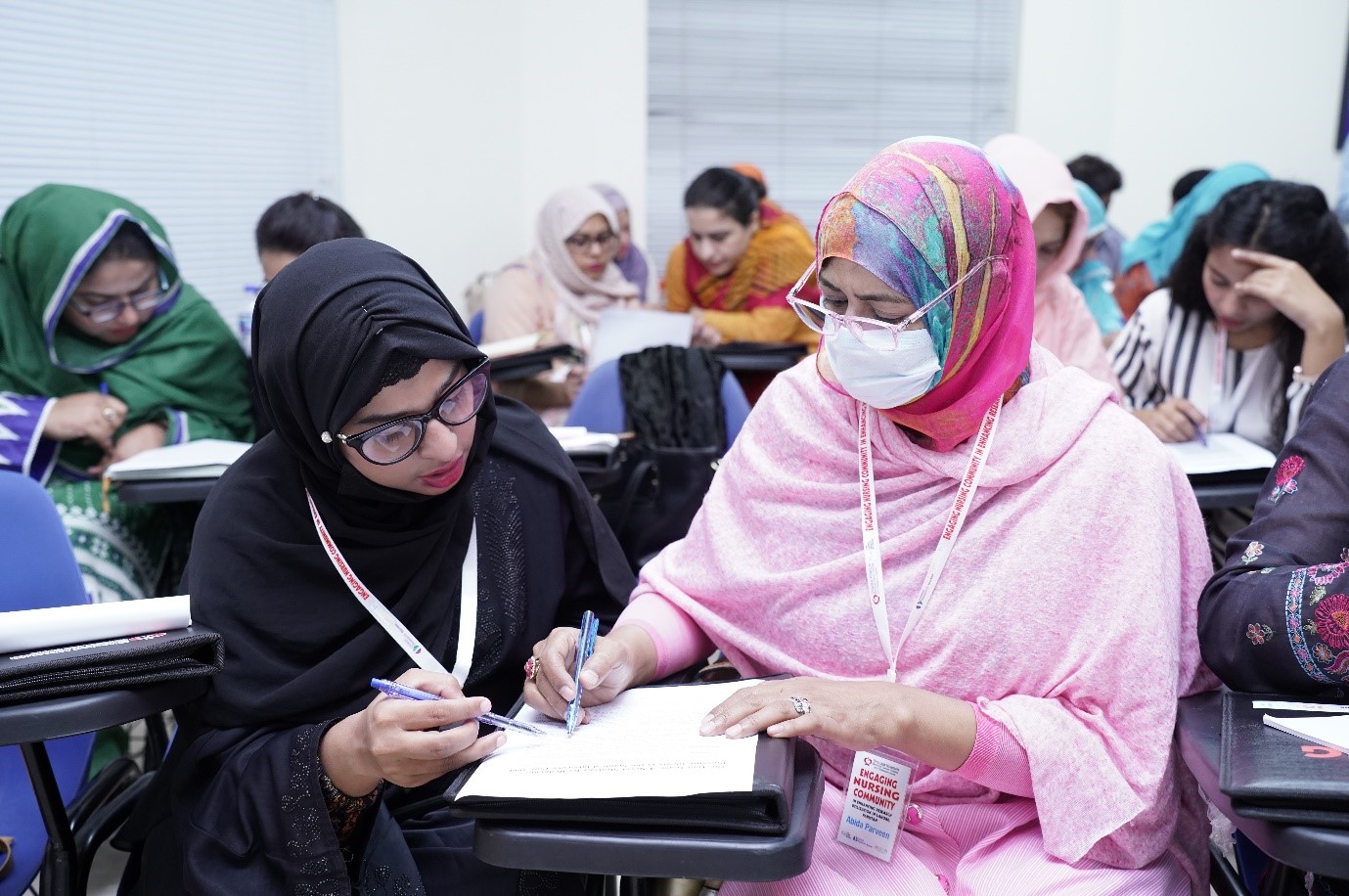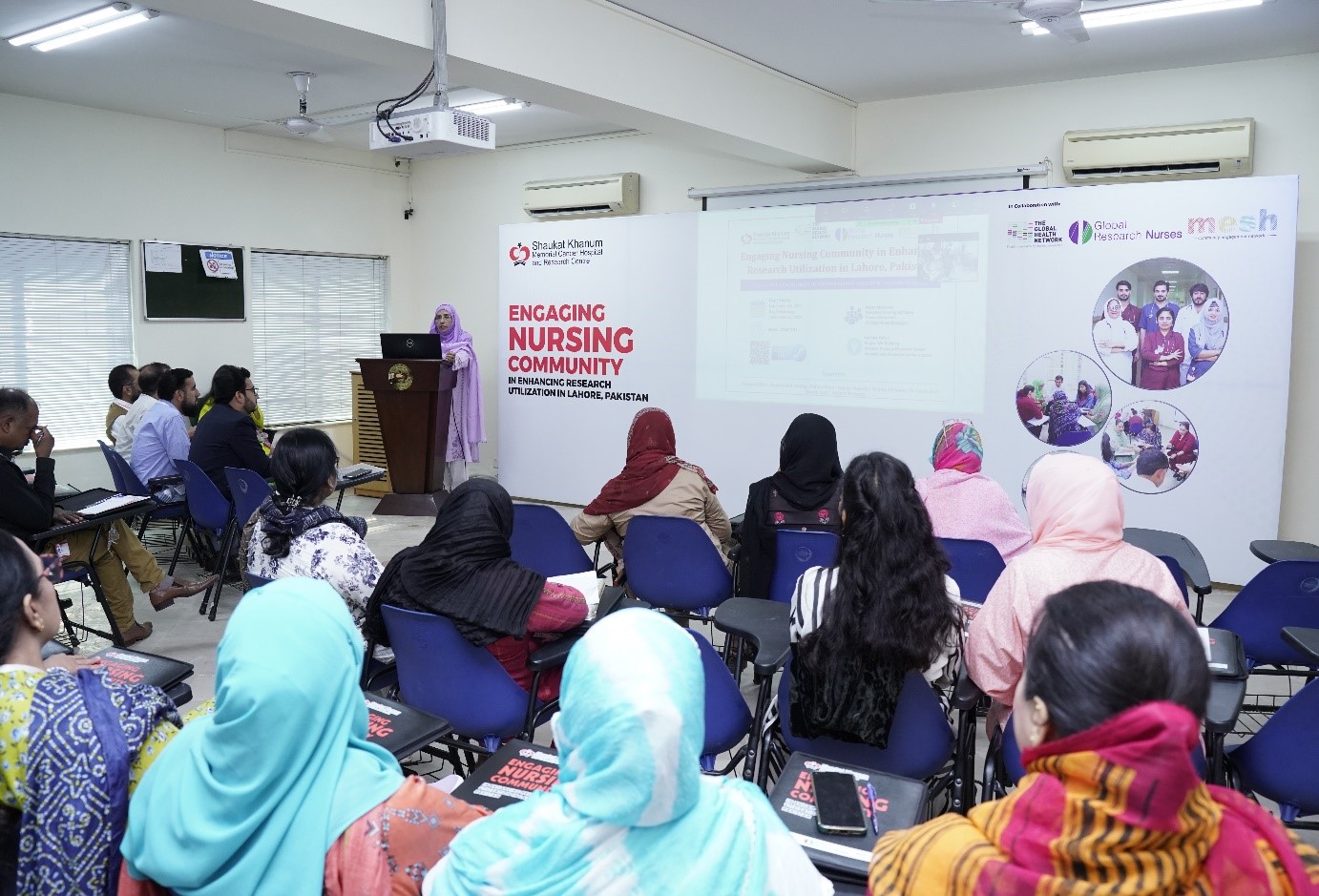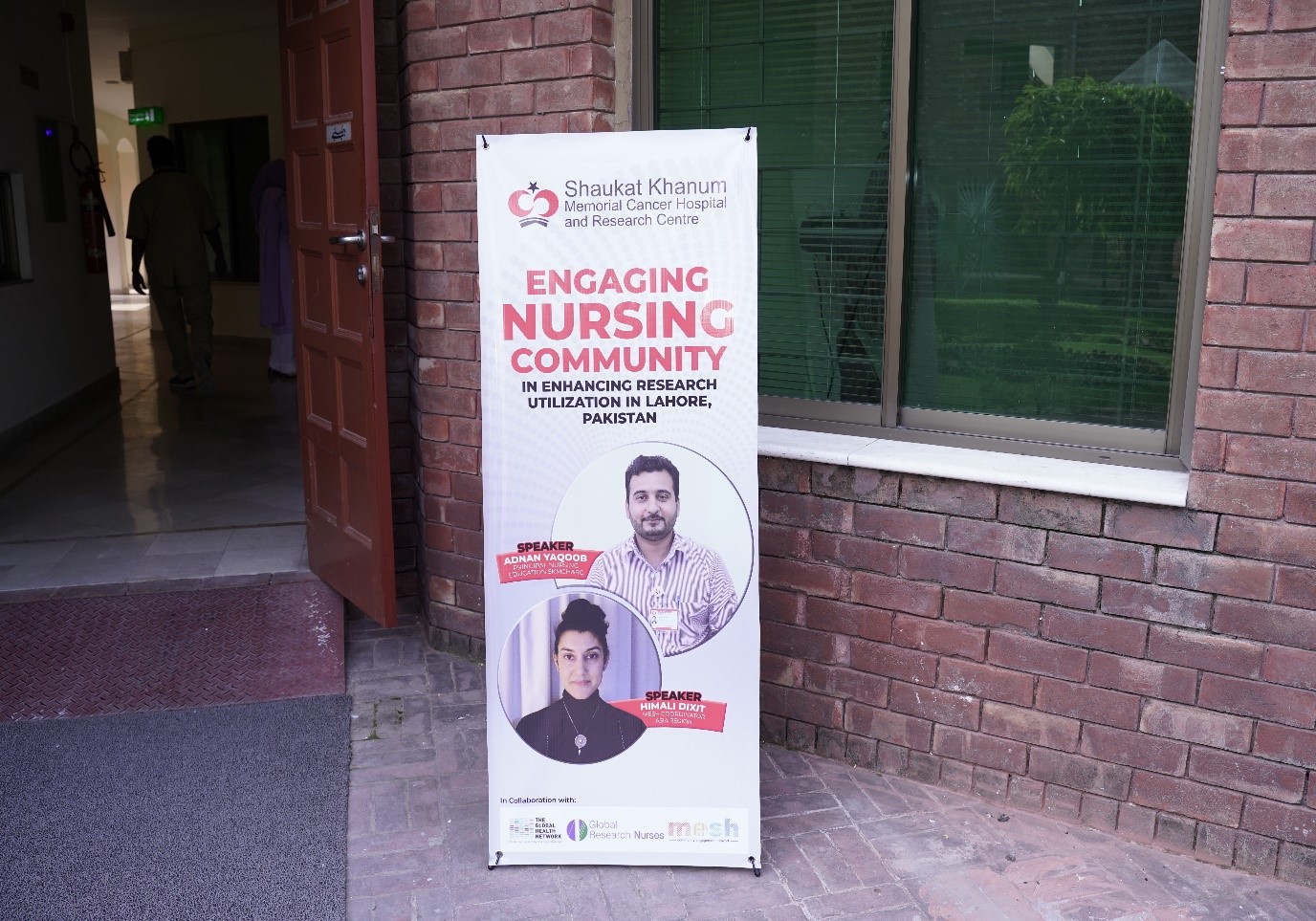

Engaging Nursing Community in Enhancing Research Utilization in Lahore, Pakistan
Shaukat Khanum Memorial Cancer Hospital & Research Centre (SKMCH&RC), Lahore
September 27 & 28, 2024
A strong willingness to train others to expand research utilization and community involvement. Shaukat Khanum Memorial Cancer Hospital & Research Centre (SKMCH&RC) conducted the two workshops on "Engaging Nursing Community in Enhancing Research Utilization," on 27th and 28th September 2024 in Lahore, which attracted more than 125 registrations from participants across 30 institutes which reflected strong appetite for the event. These workshops were facilitated by speakers from SKMCH&RC, Shifa Tameer-e-Millat University Islamabad, and MESH, the workshops were organized in collaboration with The Global Health Network with the key objectives included understanding the importance of nursing research, conceptualizing ideas, creating research proposals, designing community-engaged methodologies, and exploring TGHN resources. Participants engaged with real-life scenarios implemented a Train-the-Trainer model, and promoted a collaborative research culture. They enjoyed the learning experience and showed.
Nurses work in almost every part of healthcare settings, including primary, secondary, and tertiary-level care, where they deal with day-to-day business to provide optimum care to needy patients. However, research utilization is minimal in their role due to the focus on other healthcare priorities. To improve Nursing care with up-to-date knowledge and skills, nurses must use empirical evidence (EE). To use EE, nurses should have a sound knowledge of Research and skills to utilize and conduct research projects for better provision of care. Therefore, this workshop is designed to enhance nurses' capacity to utilize and conduct different research methodologies that engage the community for their health promotion and generate ideas for future research projects.
Aims, Objectives, and Outcome
1. Understand the Importance and Essential Components of Research in Nursing:
- Objective: To understand the critical role of research in advancing nursing practices and improving patient care.
- Outcome: Participants will identify how to integrate research into their daily nursing practice.
- Objective: To learn about the key elements that constitute a robust research study.
- Outcome: Participants will list and describe the primary components of a research project, including hypothesis, methodology, data analysis, and conclusion.
- Objective: To develop the ability to utilize existing research findings to improve nursing practices (evidence-based practice).
- Outcome: Participants will demonstrate how to apply research evidence to improve patient care in their respective healthcare settings.
2. Conceptualize Research Ideas and Create a Research Proposal Outline:
- Objective: To understand the process of generating and refining research ideas that address their healthcare challenges.
- Outcome: Participants will develop and present research ideas relevant to their clinical settings and community health needs.
- Objective: To learn how to construct a comprehensive research proposal.
- Outcome: Participants will create detailed outlines for research proposals, including objectives, literature review, methodology, and anticipated outcomes.
3. Design Research Methodologies for Community Engagement (group activity):
- Objective: To recognize the value of involving the community in designing research interventions.
- Outcome: Participants will understand how community engagement can enhance the relevance and impact of their research projects.
- Objective: To gain practical skills in designing research methodologies appropriate for their research questions.
- Outcome: Through group activities, participants will draft research methodologies tailored to their conceptualized research ideas, ensuring relevance and feasibility.
4. Introduction to TGHN Resources
- Objective: To discover how The Global Health Network (TGHN) resources can support their research development.
- Outcome: Participants will utilize TGHN tools and resources to aid in the development and execution of their research proposals.
5. Train-the-Trainer Model Implementation:
- Objective: To prepare nurse participants to train others in their institutions on research utilization and methodologies.
- Outcome: Participants will be equipped with training skills and materials to disseminate knowledge and practices within their organizations, fostering a culture of continuous learning and research engagement.
6. Promote Collaborative Research Culture:
- Objective: To encourage collaboration among nursing professionals in research activities.
- Outcome: Participants will build networks with peers and research experts, promoting ongoing collaboration and support for research initiatives.
Workshop Structure and Content
The workshop, "Engaging Nursing Community in Enhancing Research Utilization", was a one-day event held at Shaukat Khanum Memorial Cancer Hospital and Research Centre, Lahore. It brought together expert facilitators and nursing professionals to focus on strengthening research capacity within the nursing community. The format included presentations, group activities, and interactive sessions designed to encourage active participation. Each session addressed key components of the research process, with a blend of theoretical knowledge and practical applications. The day’s agenda spanned approximately 8 hours (9:00 AM – 5:00 PM), including breaks for tea, lunch, and prayer.
The workshop offered a full-day training program designed to equip nursing professionals with essential research skills. The event began with a welcome and introduction by Ms. Rehana Elahi, Director of Nursing, followed by a pre-test to assess the participants' baseline knowledge. Muhammad Ishtiaq, Associate Dean at Shifa Tameer-e-Millat University, delivered a session on the importance of nursing research in improving patient outcomes, emphasizing the need for evidence-based practice. Shams Ul Huda, Assistant Director of Nursing, guided participants in conceptualizing research ideas and developing research proposal outlines, while Adnan Yaqoob, Principal of Nursing Education, led an in-depth session on designing research methodologies for community engagement, covering both qualitative and quantitative approaches.
The afternoon sessions began with Dr. Farah Asif, Clinical Research Administrator, introducing The Global Health Network (TGHN) resources to support participants in conducting research. This was followed by interactive group activities led by Salima Khowaja, a Nursing Lecturer Practitioner, which encouraged the practical application of research concepts. Himali Dixit, MESH Coordinator for Asia, conducted a session on real-life research scenarios, illustrating how research can address healthcare challenges. The workshop concluded with Ms. Farida Khan, Assistant Director of Nursing Education, who discussed the implementation of a train-the-trainer model to foster a collaborative research culture. The day ended with a post-test and feedback session, ensuring participants left with enhanced research skills and a stronger commitment to research utilization in nursing.
Attendance Report
A total of 77 participants attended the workshop out of 100 in two days. On day one, 45 participants attended, however, on day two, only 32 participants participated in the workshop. The reason for the low uptake on the second day was weather conditions in Lahore, where there was heavy rain. Despite this, 32 participants made it to attend, which reflects their dedication and thirst for learning.
The participants of the workshop represented a diverse group of nursing professionals from various public and private institutions across Lahore. They held roles such as:
- Nursing Officers
- Charge Nurses
- Team Leaders
- Clinical Nurse Managers
- Nursing Instructors
- MS Nursing Scholars
- Lecturers
- Assistant Professors
- Associate Dean
This highlights a wide range of expertise and responsibilities within their respective institutions. Many participants were from prestigious organizations, reflecting the city-wide reach of the event.
These professionals brought varying levels of experience with interests spanning clinical practice, nursing education, research, and healthcare management. Their shared goal was to enhance their research skills and contribute to the advancement of evidence-based nursing practice, community engagement, and healthcare improvement in Pakistan. The participants were particularly keen on learning about research methodologies, proposal development, and practical applications of research in clinical settings, as well as fostering a collaborative research culture within their institutions.
Outcomes and Evaluation
To assess the impact of these workshops, participants completed pre-and post-tests. On 27th September 2024, the mean score of participants on the pre-test was 7.9 out of 12, while the post-test score increased significantly to 10.5. A notable improvement in knowledge and understanding after the session was reflected. Similarly, on 28th September 2024, the participants' pre-test mean score was 6.86 out of 12. After the workshop, their mean post-test score rose to 10.7, which indicated a marked enhancement in their comprehension of the topics covered. These results demonstrate the effectiveness of the workshops in elevating participants' research knowledge and skills.
Comments from Attendees and Summary of Feedback
The two-day workshops on 27th and 28th September 2024 were highly successful, with participants expressing a great deal of satisfaction. The workshop and facilitators received scores of 67.02 out of 70 on the first day and 66.7 out of 70 on the second day. These high ratings reflect the value participants found in both the content and the facilitation of the workshops.
Participants highlighted several key areas of appreciation:
- The workshops provided an excellent platform for enhancing knowledge about research utilization in nursing.
- The content was elaborative and explanatory, with many participants finding the sessions highly relevant to their research needs.
- The focus on community-based research was particularly valued, with several attendees expressing interest in conducting similar research in their settings.
- Many participants appreciated the interactive and activity-based nature of the sessions, which facilitated deeper engagement with the material.
While the feedback was overwhelmingly positive, participants also provided suggestions for future workshops:
- Attendees suggested that these workshops should be conducted periodically and should involve a wider group, including clinical nurses and bedside nursing research topics.
- There was a strong desire for more workshops and sessions, particularly those that address both community engagement and patient benefit outcomes.
- Some participants mentioned that advertising and promoting the outcomes of nursing research could further enhance its impact on the community and patient care.
Recommendations
1. Enhancing Knowledge and Skills through More Workshops
Participants expressed a strong desire for more workshops to further enhance their knowledge, particularly in community-based nursing research. Repeated calls for ongoing learning indicate that future workshops should be organized periodically to maintain engagement and continue skill development.
- Participant Quote: "More sessions and workshops should be conducted to enhance students' knowledge and career interests."
- Recommendation: Organize regular workshops with a focus on specific research skills and emerging topics in nursing research to meet participants' ongoing learning needs.
2. Involving Clinical and Bedside Nurses
Several participants noted that while community-based research was valuable, future workshops should also address bedside nursing research and involve clinical nurses. This would help bridge the gap between clinical practice and research, promoting research utilization at the bedside.
- Participant Quote: "It should be conducted periodically and involve clinical nurses as well."
- Recommendation: Expand the scope of future workshops to include sessions dedicated to bedside nursing research, focusing on practical research applications in clinical settings.
3. Highlighting Patient Outcomes from Research
Participants emphasized the need to communicate the impact of nursing research on patient outcomes. While community engagement was highly valued, attendees suggested that future workshops should also highlight how research benefits patients directly.
- Participant Quote: "Although nursing research benefits the community, the patient outcome should also be addressed and advertised."
- Recommendation: Include case studies and presentations in future workshops that demonstrate the direct impact of research on patient outcomes, helping nurses understand how their research can influence care.
4. Providing a More Interactive, Hands-on Learning Environment
The interactive and activity-based format of the workshops was highly appreciated by participants. However, there were calls for even more hands-on experiences and time for questions, which could deepen participants' engagement and practical understanding.
- Participant Quote: "Interactive, activity-based, and informative. Overall, very well-presented."
- Recommendation: Incorporate more Q&A sessions, group activities, and real-life case studies in future workshops to foster deeper discussions and practical engagement.
5. Addressing Specific Research Skills
Some participants identified the need for additional focus on specific research skills, which could be covered in more detail during future sessions. This could include areas like data analysis, proposal writing, or patient-centered research design.
- Participant Quote: "I learned many new ideas. Thanks for conducting such a fruitful lesson."
- Recommendation: Design specialized workshops or follow-up sessions focusing on key research skills that participants feel require further attention, such as proposal development, data collection methods, and statistical analysis.
6. Promoting and Expanding Research Utilization
Participants highly valued the focus on research utilization. However, they suggested that more emphasis be placed on promoting the outcomes of nursing research, not only within academic circles but also within the broader healthcare community.
- Participant Quote: "The outcome of nursing research should be advertised, as it benefits the community and patients."
- Recommendation: Develop strategies to promote the outcomes of nursing research more widely, potentially through collaborations with healthcare institutions and professional organizations.
Conclusion
Participants reported significant gains in their understanding of research methodologies, ethical considerations in research, and practical applications of nursing research in community settings. Feedback indicated a strong appreciation for the diverse teaching styles of facilitators, particularly for their ability to convey complex concepts in an engaging manner.
The workshop fostered connections among participants from various institutions, promoting collaboration in future research initiatives. Opportunities for ongoing discussions and partnerships were created, encouraging shared learning and resource utilization.
Participants identified specific areas in nursing and midwifery research that require further exploration, particularly in the context of LMICs, including bedside research and the impact of nursing interventions on patient outcomes. The strong call for more frequent workshops and training sessions underscored the participants’ commitment to continuous professional development and the need for sustained education in nursing research.
The significance of this workshop extends beyond individual skill development; it contributes to the broader landscape of nursing and midwifery research in low- and middle-income countries:
- Building Research Capacity: Strengthening research skills among nurses and midwives in LMICs is crucial for addressing local health challenges. Empowered healthcare professionals are better equipped to conduct relevant research that can lead to improved patient care and outcomes.
- Fostering Evidence-Based Practice: By enhancing research capacity, nursing professionals can contribute to the development of evidence-based practices tailored to the unique needs of their communities, ultimately improving healthcare delivery and health outcomes.
- Encouraging Community Engagement: Engaging nurses in community-focused research fosters a better understanding of local health issues and promotes the implementation of interventions that are culturally relevant and effective.
The workshop underscored the urgent need for ongoing efforts to strengthen research capacity in LMICs. As healthcare challenges continue to evolve, so must the skills and knowledge of nursing and midwifery professionals. Future initiatives should focus on:
- Regular Training Programs: Establish a schedule of workshops and training sessions to continuously develop nursing research skills.
- Resource Development: Providing access to resources, tools, and mentorship opportunities that support nurses in conducting high-quality research.
- Collaborative Networks: Creating networks for sharing research findings, experiences, and best practices among nursing professionals in LMICs to enhance collective knowledge and impact.
References
- Creswell, J. W., & Clark, V. L. (2017). Designing and conducting mixed methods research. SAGE Publications.
- Blumenthal DS, DiClemente RJ (editors) Community-based health research: issues and methods. New York: Springer; 2004.
- Centers for Disease Control and Prevention Principles of community engagement (1st ed ) Atlanta (GA): CDC/ATSDR Committee on Community Engagement; 1997.
- Asiri, S. (2023). Turning and repositioning frequency to prevent hospital-acquired pressure injuries among adult patients: systematic review. The Journal of Healthcare Organization, Provision and Financing. 60. 1-10.
- Defloor, T., De-Bacquer, D., & Grypdonck, M. H. F. (2004). The effect of various combinations of turning and pressure reducing devices on the incidence of pressure ulcers. International Journal of Nursing Studies. 42. 37-42.
- Melnyk, B. M., Fineout-Overholt, E., Stillwell, S. B. & Williamson, K. B. (2010). The Seven Steps of Evidence-Based Practice: Following this progressive, sequential approach will lead to improved health care and patient outcomes. Advances Journal of Nursing. 110(1). 51-53.
- Venderwee, K., Grypdonck, M. H. F., De-Bacquer, D. & Defloor, T. (2006). Effectiveness of Turning with unequal time intervals on the incidences of pressure ulcer lesions.
- Polit, D. F., & Beck, C. T. (2020). Essentials of nursing research: Appraising evidence for nursing practice.
- Lippincott Williams & Wilkins Beck, C. T. (2013). Essentials of nursing research.
- Wood, M. J., Kerr, J. C., & Ross-Kerr, J. (2010). Basic steps in planning nursing research: From question to proposal. Jones & Bartlett Publishers.
